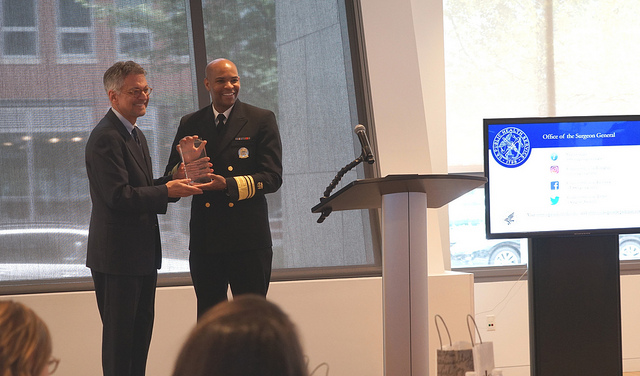 Last week’s annual “Building a Healthier Future” Summit put on by the Partnership for a Healthier America provided an opportunity to highlight what many organizations across the country are doing to address the underlying causes of childhood obesity.
Last week’s annual “Building a Healthier Future” Summit put on by the Partnership for a Healthier America provided an opportunity to highlight what many organizations across the country are doing to address the underlying causes of childhood obesity.
For Kaiser Permanente, that meant not only a chance to show that we could and did deliver on our commitment to the highest levels of exclusive breastfeeding within our hospitals, but also the opportunity to showcase how Kaiser Permanente is building upon those successes by rolling out a comprehensive “Healthy Beginnings” effort to address the health of mother and child throughout the first years of life.
Robert Riewerts, MD, regional chief of pediatrics for Southern California Permanente Medical Group and clinical lead for childhood obesity for Kaiser Permanente presented an overview of the Healthy Beginnings work at a breakout session at the Summit. We had the opportunity to interview Dr. Riewerts alongside Jocelyn Audelo, RN, senior consultant at Kaiser Permanente’s Care Management Institute who coordinates Kaiser Permanente’s interregional work around Healthy Beginnings.
CTH Blog: Why is Kaiser Permanente focused on supporting a program of “Healthy Beginnings?”
Dr. Robert Riewerts: As an integrated health care system, Kaiser Permanente has been very interested in providing the best support we can to breastfeeding mothers. In our system, we deliver nearly 90,000 babies each year, so we have an incredible opportunity to make an impact on the lives of those babies.
Childhood obesity is a serious problem in America, and we’ve learned from research and from the care of our own patients, that if we support breastfeeding effectively, we’re going to produce a population of children that start out healthy. With effective breastfeeding support, those babies will get the important nutrients they need as young babies and they’ll be more likely to be healthy children later on.
Jocelyn Audelo, RN: Pregnancy is also a critical time in the development of healthy habits. As a new family is coming into being, we have the opportunity as a health care system to help support some of the habits – like breastfeeding, healthy diet patterns, and plenty of movement – that can translate to a pattern of well being over time for a family.
CTH: What can you tell us about the recent research showing trends in obesity reduction in children age 2 – 5?
RR: There’s been a lot of excitement around the recent article in the in the Journal of the American Medical Association that showed a 43% reduction in obesity in early childhood, ages 2 – 5, range. This research gives us hope that the work that we’re doing is effectively reducing the rate of childhood obesity. One of the factors quoted in the article is the fact that early breastfeeding and the support of breastfeeding may be an effective reason why we are seeing this reduction in obesity.
Although we are hopeful that this is a trend for the future, we still have a whole lot of work to do. And Kaiser Permanente’s relationship with the Partnership for a Healthier America and our commitment to the Partnership represents a road that we will be staying the course on, in order to make greater progress in addressing childhood obesity.
CTH: What would a comprehensive Healthy Beginnings program look like?
JA: At Kaiser Permanente, we feel that there is an opportunity to broaden our approach beyond just breastfeeding in support of a healthy weight trajectory throughout life, that really has its beginning in the pregnancy and early childhood time frame. Healthy Beginnings is our Kaiser Permanente approach to support healthy weight, active living and good nutrition from the time before a woman becomes pregnant, throughout her pregnancy and throughout the early life of the child. Examples might include things like helping women to get healthy and fit before conceiving, supporting women and families in emotional and behavioral health, helping pregnant women to stop using tobacco and other harmful substances, and teaching how families can incorporate a pattern of healthy foods – with plenty of vegetables and fruits – for babies and young children.
RR: Kaiser Permanente has a wealth of employees involved in all sectors of health care. We want all of our physicians, our nursing staff, our doctors who are delivering babies and caring for mothers during pregnancy to be aware of the importance of breastfeeding and to really start that infant out on a good healthy lifestyle.
JA: We know there are lots of things that we can do clinically to support a healthy beginning, but we know it needs to be much bigger than that. It needs to involve our community partners, our built environment to support physical activity and good nutrition, and numerous areas that we need to continually develop capacity in.
Since we know that what happens during pregnancy and the early childhood timeframe is critically important for a life course of Total Health, we’re focusing intensely on this Healthy Beginnings work. We are very excited about the journey we’re on, to support women and children and their families on a trajectory of Total Health from the beginning.



